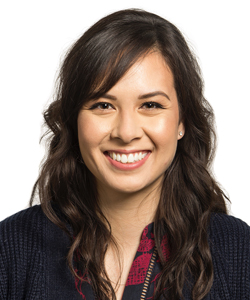Feature: Nurturing leadership in postgraduate medical education
By Emily Leighton, MA'13
Faculty, staff and learners in Postgraduate Medical Education (PGME) are creating unique learning opportunities and contributing to the knowledge of practice at Schulich Medicine & Dentistry.
Their innovative approaches are nurturing excellence and leadership in postgraduate medical education – a goal in the School’s five-year strategic plan.
Confronting the hidden curriculum
As a paediatrics resident, Dr. Robin Mackin remembers feeling frustrated with the culture of medicine she was observing and participating in. But it wasn’t until late in her residency that she had a way to describe what she was experiencing – identifying it as the hidden curriculum.
“I realized the hidden curriculum was leading to burnout, impacting my career satisfaction and, at times, making me feel a bit hopeless about my future career,” she said. “Once I had the language and understanding of the hidden curriculum, it gave me hope to help others and create more positive dialogue by generating awareness.”
 Since joining the School’s faculty in October 2020, Mackin has been leading the development of a training workshop designed for residents and fellows exploring the hidden curriculum – the norms and values communicated to learners through every day actions and behaviours that can undermine the formal curriculum.
Since joining the School’s faculty in October 2020, Mackin has been leading the development of a training workshop designed for residents and fellows exploring the hidden curriculum – the norms and values communicated to learners through every day actions and behaviours that can undermine the formal curriculum.
“PGME learners are in a unique position since they are impacted by the hidden curriculum and they are also facilitators of it,” she said. “We want to bring awareness to how it’s influencing their learning and professional identity formation, while also helping them be mindful of shifting their own actions and behaviours to promote a positive hidden curriculum.”
The training consists of an online pre-workshop module and a facilitated session delivered in person or virtually. The online module overviews foundational concepts, key terminology and reflective activities. The facilitated session, typically about 90 minutes, builds on this knowledge through small-group discussions and provides communication frameworks and strategies to help learners address the hidden curriculum in real time.
“This topic is relevant to everyone, so even if they weren’t familiar with the term pre-workshop, everyone is coming into the discussion as an expert” said Mackin. “We ask them to reflect on their own experiences and challenge them to think about their role in the hidden curriculum.”
With support from Bela Ferreira, Education Developer, Mackin has facilitated the training for five postgraduate programs in the past year, working with program leaders to tailor the workshop to their specific needs. Some programs have also engaged faculty to participate.
While she acknowledges that a one-time workshop isn’t enough to completely change the culture, Mackin believes it is an important first step. “Our hope is that programs feel comfortable taking the next step to engage further in these important discussions. As facilitators of the hidden curriculum, we need to be reflecting on how to hold ourselves accountable and engage with this on a regular basis.”
Empowering future health care leaders
What skills do doctors need to navigate change? For Dr. Andrew Park the answer lies outside what is traditionally taught in medical school and residency. He believes creativity, critical thinking, collaboration and compassion are the key.
“These skills are so important in medicine,” he said. “They make us more agile, more adaptable to change and technology, and better able to relate to our patients. This is how we cope with a society that is changing so rapidly.”
Park is spearheading a new four-part leadership certification course for residents focused on this philosophy. The course, offered synchronously online, is built around four key themes: emotional intelligence, teamwork, leadership, and health and wellness. Each theme is covered in an interactive, three-hour seminar.
“These are not difficult concepts to understand, but they become complicated when we try to apply them in health care settings,” said Park. “We want residents to express themselves, learn and apply these concepts in a low-pressure setting, so when they encounter difficult situations, they are better equipped to manage them.”
The four seminars are taking place quarterly throughout the year. Park is bringing in physicians from range of specialties, as well as professionals from other industries, to share their expertise and facilitate discussion.
The course is capped at 25 spots. To apply, residents submitted a statement of interest and had to receive approval from their program directors. The first cohort represent a number of residency programs and levels of training, from first- to fifth-year residents.
Park would like to offer the course annually, incorporating resident feedback, updated material and new ideas with each iteration. He says support from Dr. Lois Champion, Associate Dean, Courtney Newnham, PhD, Manager, and Bela Ferreira, Education Developer, has been instrumental in the planning and implementation of the course.
Park was inspired to pursue this type of leadership training during his MBA studies. “Working with people from other industries, I realized how applicable and important these human skills are to medicine,” he said. “I’m hopeful there are others who want to take part in teaching and modelling these skills, so we can make this an integral part of postgraduate medical education at the School.”
Supporting a culture shift in learning and assessment
As postgraduate programs continue to implement competency-based medical education, the PGME team is focused on supporting residents and faculty making the transition to the Competence by Design (CBD) curriculum.
They recently developed a series of five accredited workshops that build on the RX-OCR (Rapport, eXpectations, Observe, Coach and Record) framework from the Royal College of Physicians and Surgeons of Canada.
The workshops are delivered synchronously, distinguishing them from the Royal College’s individual, self-paced offerings, and focus on the RX-OCR themes, as well as feedback and communication.
 By providing interactive group workshops, PGME is able to emphasize discussion and collaboration, using case studies to assist the learning.
By providing interactive group workshops, PGME is able to emphasize discussion and collaboration, using case studies to assist the learning.
“People may not have had a chance to explore the curriculum in this way, to ask questions and express themselves,” said Susan Ibdah, PhD, CBME Curriculum and Assessment Specialist. “These workshops provide the perfect avenue to learn, to communicate and to problem solve.”
Keeping in mind the unique needs and cultures within each program, the PGME team is able to tailor the workshops to align with program priorities and goals for professional development. Programs can sign up for one or all of the workshops and work with PGME on the best way to deliver the content. Participants also receive certification credits from the Royal College.
“We take an open approach to the workshops to allow for autonomy in learning and organization,” said Ibdah. “CBD is a living curriculum that continues to grow and evolve, and we’re happy to work with programs to find a path that best suits their needs.”
“Innovation is the lifeblood of PGME and the work we do,” she added. “We’re always asking how we can do things better to support learning and development.”










